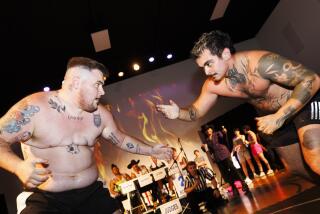Finally Out of Its Holding Pattern
- Share via
ATHENS — After years of lobbying and cajoling and trying to persuade in various tongues, after predictions unfulfilled and dreams unrealized, after watching from the shadows as their male counterparts got gold and glory, female wrestlers finally got on the mats Sunday in their very own Olympic competition.
The sport’s Olympic debut came at 9:30 a.m. at the Ano Liossia Olympic Hall, where Stayroula Zygouri of Greece faced Stephanie Gross of Germany.
So what was it like, not only having women’s wrestling begin in one’s homeland, but getting the additional honor of being the first to compete?
Shrug.
“It’s too early in the morning to wrestle,” Zygouri said.
Others were not so blase.
Tricia Sanders is a coach for the U.S. team, which began the day with four wrestlers in the competition: Patricia Miranda (105.5 pounds), Tela O’Donnell (121), Sara McMann (138.75) and Toccara Montgomery (158.5). Sanders is the most decorated female wrestler in U.S. history with four gold medals and a silver in world competition. Yet she was forced to watch from the sideline as the bureaucratic battle to bring her sport to the Olympics raged on.
“We were told it might happen in ‘92, ’96 and 2000,” Sanders said as competition was waged in the background. “It’s sad that we didn’t see this in my day. I trained for three Olympics and then had to sit and watch when it didn’t happen. But that’s OK because it’s happening now.”
Olympic officials weren’t the only ones who resisted legitimizing women’s wrestling. The U.S. women can all tell stories of struggles they had to be accepted long after other women’s sports had become a part of the national fabric.
McMann’s entry into the sport wasn’t an act of defiance, but rather one of obedience.
“My brother was a wrestler,” she said, “and I was his wrestling dummy, whether I wanted to be or not.”
By the time she got to high school, in Marion, N.C., McMann was excited about wrestling, even though she was the only girl on the team.
“My coach thought I might get hurt, or that I was only doing it to get attention,” McMann said. “Finally, he realized that there was no way I would work three hours a day in high school at wrestling if I just wanted to get attention or be around boys.”
Miranda’s father, a physician, was concerned that wrestling in high school would cost his daughter time she needed to pursue academics. On occasion, he would show up at school and pull her out of wrestling. He wouldn’t even discuss the sport with her.
“When we would talk, wrestling never came up,” Miranda said. “When I was away at competition, he would never ask how I did. As long as I didn’t bring wrestling up, we could be friends.”
Today, their relationship is better than ever, she said. Jose Miranda concedes his daughter was right to pursue her passion for wrestling. And Patricia will satisfy her father’s passion for academic excellence by entering Yale Law School in the fall.
Jose was in attendance Sunday, cheering Patricia on as she and McMann advanced to today’s semifinal round.
Sanders said opinion on women’s wrestling has been “all over the board.”
“There were people who thought women wrestling would bring the world down,” she said. “And there were people thinking it was a great thing for women. Us, we were just having fun.”
For Montgomery, becoming a wrestler was an in-your-face response. “When wrestling came to my high school [East Technical in Cleveland], I was advised against joining the team,” she said. “Everybody knows that when you tell a teenager not to do something, they are going to do it.”
O’Donnell can relate to that.
“In junior high, I was the first girl to wrestle,” she said. “If I beat a boy, the other boys would get upset and the parents wouldn’t want me to wrestle their sons.”
While helping to change Olympic wrestling, the U.S. team is also changing the image of female wrestling. “When people think of wrestlers, they expect us to be bigger, with maybe two teeth missing, have a hunchback or look like some kind of ogre,” McMann said.
Not this group. Miranda and O’Donnell could pass for gymnasts. .
“One of the great things about being in the Olympics is that you don’t have to have the obligatory 10-minute conversation with someone when they find out you are a women wrestler,” Sanders said. “You won’t have to explain what it’s all about. People will know from watching the Olympics.”
Said O’Donnell, after competing Sunday: “This is huge. We get to show what we do to the world. This is so much bigger than just me.”
It may have taken an extra century to get started -- male wrestling was introduced at the 1904 Olympics in St. Louis -- but the women have finally arrived.
Now if they can only do something about that early starting time....
More to Read
Go beyond the scoreboard
Get the latest on L.A.'s teams in the daily Sports Report newsletter.
You may occasionally receive promotional content from the Los Angeles Times.






